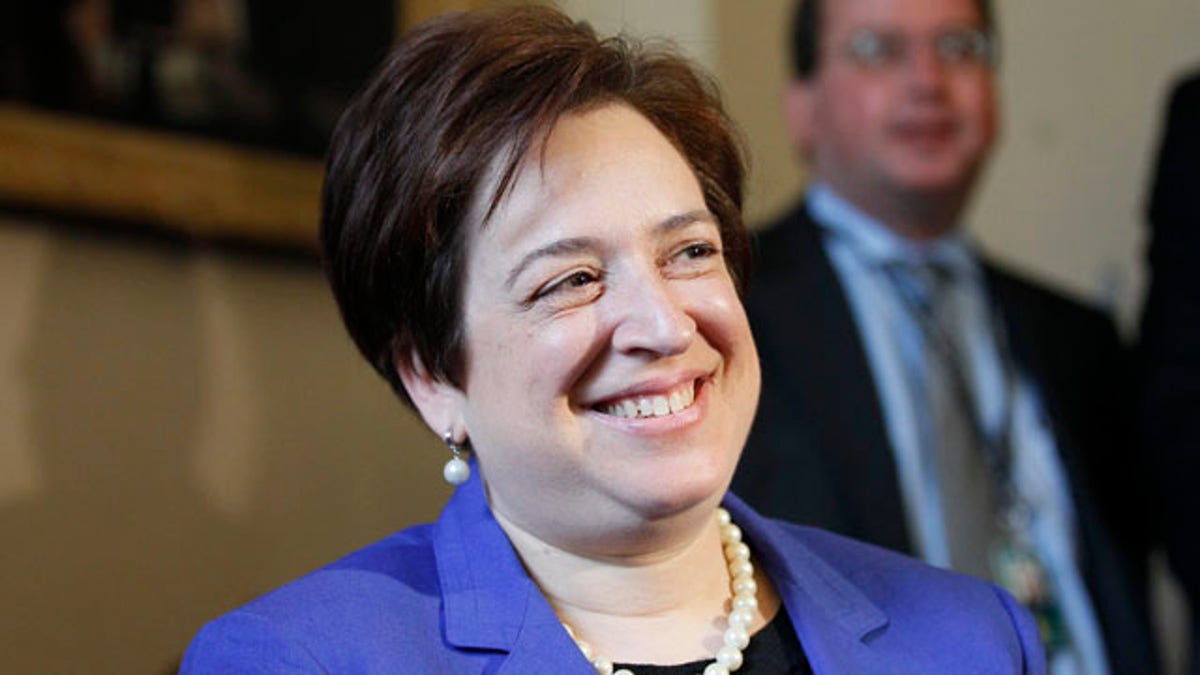
Supreme Court nominee Elena Kagan (AP2010)
As the number of President Obama's judicial appointments and nominations continues to grow, it appears pretty clear that he does not care about the individual's right to self-defense. We can tell this by looking at the record of his two Supreme Court picks but also by examining the long list of lower-level judicial appointments. All of these reflect a pattern of favoring person who have written anti-gun opinions.
Elena Kagan, Obama's newest Supreme Court nominee, fits this mold. The Supreme Court has only been very narrowly supportive of an individual's right to bear arms. For example, there was the 5-4 vote in the Heller decision when it struck down Washington, D.C.'s handgun ban in 2008 and a similar 5-4 vote in on Monday in the decision to strike down Chicago’s ban in “McDonald.”
In the future, Kagan’s opinion could be crucial: If Justice Kennedy or one of the four more conservative members of the court were to retire or die, her vote could easily tip the balance on gun rights.
Of course, Obama’s judicial nominations go against his 2008 campaign promises about guns. During the presidential campaign, then-Senator Obama, despite his past support for gun bans, assured voters that he had always supported the Second Amendment as an individual right:
"I have said consistently that I believe that the Second Amendment is an individual right, and that was the essential decision that the Supreme Court came down on."
With those words in mind, alarm bells should have gone off during Elena Kagan’s confirmation testimony to the Senate Judiciary Committee on Tuesday. Here’s what Kagan told Sen. Charles Grassley (R-Iowa):
It has long been thought, starting from the “Miller” case, that the Second Amendment did not protect such a right. . . . Now the Heller decision has marked a very fundamental moment in the court's jurisprudence with respect to the Second Amendment. And as I suggested to Senator Feinstein there is not question going forward that ‘Heller’ is the law, that it is entitled to all the precedent that any decision is entitled to and that is true to the ‘McDonald’ case as well...
There are two big problems with Kagan’s remarks: she inaccurately describes the 1939 "Miller" case and her claims to follow stare decisis are meaningless.
The "Miller" decision said that the Second Amendment protected civilian use of firearms that are used in the military and that a sawed off shotgun wasn't a military weapon. But the court went no farther in explaining the right. There was no discussion of the modern liberal view of a “collective right.” The very short opinion didn’t say if there was an individual right to own military weapons. The issues were never addressed.
However, Kagan’s argument is precisely what Justice Stevens wrote about when he and the other liberal Supreme Court justices opposed “Heller.” They claimed that Miller was the real precedent and that there was no individual right to own a gun. Stevens asserted that “Heller” and “McDonald” were the real aberrations from court precedent.
Kagan’s statement surely shows that she also believes the “Heller” decision broke with past precedent. Saying that “Heller” and “McDonald” are “entitled to all the precedent that any decision is entitled to” also means that her strained interpretation of Miller is entitled to the same precedent.
Obama's first Supreme Court pick, Sonia Sotomayor, looked no better. For instance, in one of her decisions as an appeals court judge, she argued that the Second Amendment would not block any gun-control laws as long as the politicians passing the laws thought the weapon was "designed primarily as a weapon and has no purpose other than to maim or, in some instances, kill."
In other words, as long as politicians think that they are doing the right thing, even if totally misguided, these good intentions trump any individual right to bear arms.
With an interpretation like the one offered by Justice Sotomayor, the Supreme Court would never have struck down Washington, D.C.’s gun ban, let alone any other gun-control law.
Unfortunately, there is no easy quick-fix: every place in the world that has tried a gun ban -- not just Chicago and Washington, D.C. -- has seen an increase in murder rates.
But despite her past decisions, Sotomayor clearly promised the Senate Judiciary Committee that as a Supreme Court justice she would follow Heller and accept its decision that the Second Amendment guarantees an individual right to own guns for self-defense. Here's this example from her 2009 confirmation hearing:
Senator Patrick Leahy: “. . . you, in fact, recognized the Supreme Court decided in ‘Heller’ that the personal right to bear arms is guaranteed by the Second Amendment of the Constitution against federal law restrictions. Is that correct?
Sotomayor: It is.
Yet, in the Supreme Court’s decision on Monday to strike down the Chicago handgun ban, Sotomayor apparently completely forgot her promise last year. She completely signed on to Justice Breyer's claim:
I can find nothing in the Second Amendment’s text, history, or underlying rationale that could warrant characterizing it as 'fundamental' insofar as it seeks to protect the keeping and bearing of arms for private self-defense purposes.
Breyer’s dissent provides a clear warning: the Supreme Court is just one vote away from totally reversing “Heller” and “McDonald” and declaring that the government can completely ban gun ownership.
With Kagan on the Supreme Court, there will continue to be four (out of nine justices) who support the government’s decision to completely ban gun ownership.
No Senator can seriously claim that he strongly supports gun ownership and still vote for Kagan’s confirmation.
John R. Lott, Jr. is a FoxNews.com contributor. He is an economist and author of "More Guns, Less Crime."(University of Chicago Press, 2010), the third edition of which was published in May."
Fox Forum is on Twitter. Follow us @fxnopinion.
